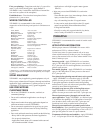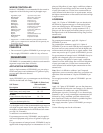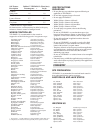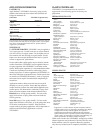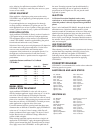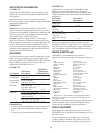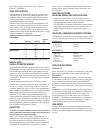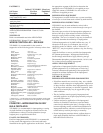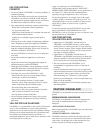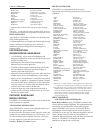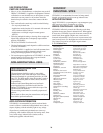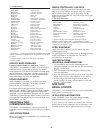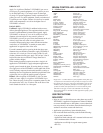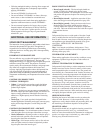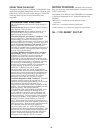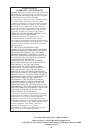
BROADCAST
Apply 2 to 4 gallons of DuPont™ VELPAR® L per acre as
coarse spray by ground equipment or 2 to 3 gallons per acre
by air (helicopter only). Use enough water for thorough
c
overage. For ground equipment, usually a minimum of 25
gallons per acre. For aerial equipment, usually a minimum of
10 gallons per acre. Higher volumes of water may be needed
when water temperatures are cold or the higher rates of
V
ELPAR® L are used.
BASAL (SOIL)
Undiluted - Apply VELPAR® L undiluted with an exact-
delivery handgun applicator. This equipment delivers a thin
stream of a predetermined volume when triggered. Apply
VELPAR® L at the rate of 2 to 4 ml for each inch of stem
diameter at breast height. Do not exceed 4 gallons of
VELPAR® L per acre per year. Direct the treatment to the soil
within 3 feet of the root collar of woody plants to be
controlled. When treating large stems and when more than
one delivery of VELPAR® L is needed per stem, make
applications on opposite sides of the stem.
For multi-stemmed and low-growing brush that have stem
diameters that are difficult to determine, apply VELPAR® L
at the rate of 2 to 4 ml per 3 feet of canopy width. For tall,
slender (columnar) brush types, apply 4 to 8 ml per 3 feet of
height. Base the rate on whichever canopy dimension is
greater (width or height).
When treating brush that requires more than a single 4 ml
application of VELPAR® L, apply subsequent applications
equally spaced around the plant. If treating brush on sloped
sites, apply most of the VELPAR® L on the uphill side of the
stem. If treating resprouts from brush disturbed by cutting or
shredding, the rate of application should be proportional to the
original tree size, not just the small regrowth of sprouts.
Diluted - Mix one gallon of VELPAR® L with 5 or more
gallons of water. Apply 2 to 4 gallons of VELPAR® L per
acre. Direct the spray to the soil in a serpentine pattern so that
the swath on the soil is 6 to 12 inches wide at the base of the
brush. Swaths should be 2 to 4 feet apart.
BRUSH CONTROLLED - USE RATE
2 – 4 Gallons/Acre
* Suppression – a visible reduction in plant population and/or plant vigor
as compar
ed to an untr
eated area and generally not accepted as control.
†
F
or Cholla cactus (tr
ee-type cactus) apply VELPAR® L at the rate of 4
milliliters (mls) of product for plants up to 2 feet tall. Apply 8 mls of
product for Cholla cactus plants between 2 and 6 feet tall. For plants
taller than 6 f
eet,
apply 4 mls for each additional 2 feet of height.
When treating plants it is desirable to make applications equally spaced
around the plant.
USE PRECAUTIONS
NON-CROP
• Injury to or loss of desirable trees or other plants may result if
VELPAR® L is applied or if equipment is drained or flushed
on or near desira
b
le trees or other plants, on areas where their
r
oots ma
y e
xtend,
or in locations where the chemical may be
washed or moved into contact with their roots.
•
Application spray drift may injure desirable plants.
• Poor weed and brush control may result from the following:
–
Use on poor
l
y dr
ained sites.
–
A
pplica
tions made when the soil is saturated with water and
r
ain is imminent within 24 hour
s.
–
A
pplications to soils high in organic matter (greater
than 5%).
Alder Alnus spp
A
sh
F
raxinus spp
Aspen Populus spp
B
irch
B
etula spp
Blackgum Nyssa sylvatica
Bay, sweet Magnolia virginiana
Cactus, cholla† Optunia imbricata
Catclaw acacia Acacia greggii
C
edar, Eastern red
J
uniperus virginiana
Cherry, black Prunus serotina
C
hinaberry*
M
elia azedarach
Deerbrush Ceanothus integerrimus
D
ogwood, flowering*
C
ornus florida
Elm, American Ulmus Americana
Elm, Chinese Ulmus parvifolia
Hackberry, common Celtis occidentalis
Hawthorn Crataegus spp
Hazel Corylus spp
Hickory Carya spp
Huisache Acacia farnesiana
Juniper Juniperus spp
Locust Robinia spp
Lotebush Ziziphus obtusifolia
Manzanita, Greenleaf Arctostaphylos patula
Maple, red Acer rubrum
Mesquite Prosopis glandulosa
Mulberry Morus spp
Oaks Quercus spp
Osage-orange Maclura pomifera
Persimmon Diospyros spp
Plum, wild Prunus munsoniana
Poplar, balsam Populus balsamifera
Poplar, yellow Liriodendron tulipifera
Privet Ligustrum spp
Rose, multiflora Rosa multiflora
Sassafras* Sassafras albidum
Soapweed, small (yucca) Yucca glauca
Snowbrush (varnishleaf) Ceanothus velutinus
Sourwood Oxydendrum arboretum
Sumac Rhus spp
Sweetgum Liquidambar spp
Tallow, Chinese Sapium sebiferum
Waxmyrtle Myrica cerifera
Whitebrush Aloysia gratissima
Willow Salix spp
22



